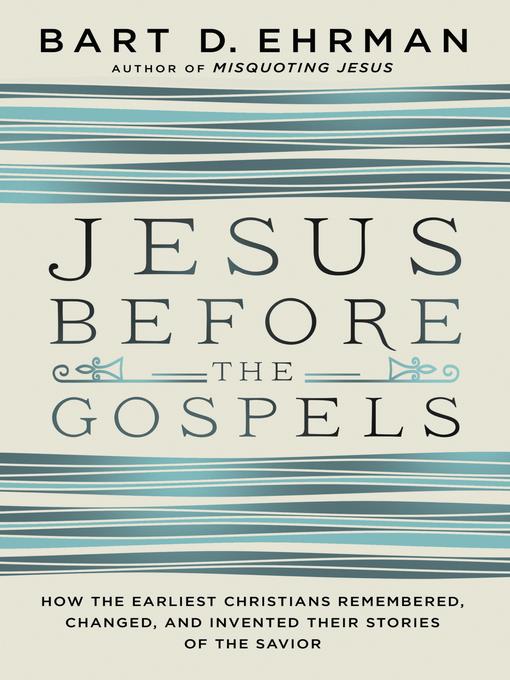
Jesus Before the Gospels
How the Earliest Christians Remembered, Changed, and Invented Their Stories of the Savior
کتاب های مرتبط
- اطلاعات
- نقد و بررسی
- دیدگاه کاربران
نقد و بررسی

March 14, 2016
With his typical humor, passion, and vivacity, Ehrman (How Jesus Became God) explores the ways that memory shapes, distorts, changes, and preserves the stories of Jesus passed along by the Christian community. He points out, for example, that the numerous accounts of Jesus circulating before and after his death each portrayed a very different man, one shaped by the tellers' own religious and cultural concerns. Ehrman locates the empirically verifiable memories of Jesus that inform the gospelsâhe was an itinerant teacher; he had a number of followers; he was born and raised a Jewâand then examines the ways that early Christian literature preserves or invents its own memories of Jesus. Engaging in a close reading of Matthew's account of the Sermon on the Mount, he illustrates that the event represents a "collection of sayings of Jesus that the writer of the gospel has shaped into a long and memorable sermon." Before readers get too uncomfortable, Ehrman convincingly points out that the remembered Jesusâthe figure whose existence is shaped by the memories of him handed down through timeâis the one who made history. Ehrman's provocative book raises engaging questions that drive readers back to the sources of our information about Jesus, challenging them to read the gospel with fresh, skeptical eyes.

January 15, 2016
Understanding the role of memory in the formation of the Christian Gospels. In his latest work on the historical Jesus, Ehrman (Religious Studies/Univ. of North Carolina; How Jesus Became God: The Exaltation of a Jewish Preacher from Galilee, 2014, etc.) delves into the oft-neglected role of memory in the context of the early Christian church. The author argues that memory is of paramount importance to understanding such basic Christian writings as the four Gospels, since these arose from remembered events and were written decades after the life of Jesus. Ehrman demonstrates the widely accepted view of scholars that none of the Gospels were written by people who actually knew and followed Jesus personally. As such, each is based upon the memories of others, often transmitted through unnumbered sources in the early Christian community. Understanding the science behind memory, therefore, helps students of the Bible to understand the origins of, and differences among, the Gospels. Ehrman provides an intriguing overview of memory studies over the past century and introduces readers to a variety of important pioneers and studies in the field. The author finds that memory constructs the past. No matter if the topic is ancient history, recent news events, or personal happenings, the human understanding of all things past is constructed via memory. Furthermore, memories are often flawed or "distorted." This fact is simply a reality of the human condition; nevertheless, distorted memories lead to distorted history. Readers of the Bible can, however, assume that "gist memories" are based in solid reality. Gist memories reflect the basic situation (e.g., Jesus was crucified) without potentially distorted qualifications (e.g., dialogue at the site of the crucifixion). Despite the fact that his work is highly critical of the Bible as history, Ehrman concludes that it is still important, just as Shakespeare and Dickens are important. "The historical Jesus did not make history," he writes. "The remembered Jesus did." An intriguing new angle on the well-worn field of "historical Jesus" studies.
COPYRIGHT(2016) Kirkus Reviews, ALL RIGHTS RESERVED.

March 1, 2016
In this work, New Testament scholar Ehrman (religious studies, Univ. of North Carolina at Chapel Hill; Misquoting Jesus) draws sharp distinctions between oral culture, with its inaccurate transmissions, and modern historiography's factual exactness; eyewitness testimony and recent psychological studies; and cultural memories and modern sociology, to show how a community's motivations and concerns alter what information is maintained. The author contends that Jesus's culture was not simply "oral," that he and his followers interacted with Pharisees and Romans on many levels. Yet, Ehrman's comparisons of the way students today tell stories and the approach Jesus's followers might have taken is not necessarily precise given cultural differences, educational backgrounds, and perceptions of time. Ehrman seems to "set up a strawman," knock it down, and partially restore it as he points out that the Bible is valuable, just not as history. He argues that the Gospel writers were not claiming to be documenting history or biography; rather they were proclaiming the "good news" of Jesus as they experienced or heard of it. VERDICT For readers interested in an intriguing and entertaining take on the formation of the Gospels.--Carolyn Craft, emerita, Longwood Univ., Farmville, VA
Copyright 2016 Library Journal, LLC Used with permission.

























دیدگاه کاربران